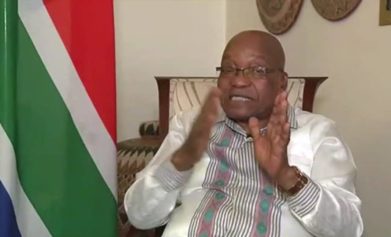In an effort to rescue his nation’s crumbling economy, South African President Jacob Zuma yesterday announced a massive building program that would spend $97 billion over the next three years to upgrade roads, ports and access to utilities, and to exploit deposits of coal and other minerals.
In addition, other critical infrastructure projects will take 15 years and $462 billion to complete, including significant investments in the private sector.
It is a bold and ambitious plan at a time when South Africa desperately needs it, as widespread wildcat strikes have devastated the country’s mining sector, which is one of the biggest areas of the South African economy. The rand has fallen 5 percent against the dollar since August and because of fallen mine production and lessened demand from Europe, South Africa’s biggest trading partner, economic growth is expected to reach just 2.6 percent this year, according to the central bank, too low to imapct an official unemployment rate of nearly 25 percent.
Significantly, all the labor unrest has hammered South Africa’s carefully cultivated image as the best place for foreigners to invest in Africa.
But Zuma hopes this focus on infrastructure will prove reassuring to foreign investors and create local jobs.
“As a job creator the infrastructure program is a clear win. Construction and maintenance alone will employ tens of thousands of people,” he said.
Zuma also lashed out at the media for focusing on the negative aspects of the unrest and his handling of the economy since he took office in 2009.
“We urge those who have access to the media from all sectors, including opposition politicians, to stop talking our country and economy down,” Zuma said. “No country should be made to withstand such negativity and total disregard of progress made.”
Zuma forcefully inserted himself in the labor disputes between the miners and business leaders this week, after weeks of criticism that he wasn’t closely enough involved.
“We can no longer allow the government to fiddle while the economy suffers,” Lindiwe Mazibuko, parliamentary leader for the opposition Democratic Alliance, said this week. “We need bold leadership and a clear, growth-orientated plan to ensure that this downturn is reversed.”
Zuma called on the mine workers to return to work and asked their bosses to agree to year-long salary freezes in a show of good faith. His intervention came as the Gold Fields gold mine threatened to fire up to 25,000 employees if they didn’t return to work—two weeks after Anglo American Platinum fired 12,000 striking workers.
Zuma met at the same time with the business leaders from the mines and the union leaders representing the striking workers.
“We are agreed that violence and intimidation must come to an end. These have no role in our system and simply have a negative effect,” Zuma said. He asked the executives to freeze salaries and bonuses for the next year as a “strong commitment to build an equitable economy” and to address income inequality.
“The parties make a call on CEOs and executive directors in the private sector and senior executives in the public sector to agree to a freeze in increases in salary and bonuses over the next 12 months, as a strong signal of a commitment to build an equitable economy,” Zuma said. “They call for an informed national conversation on income inequalities and how best to address them.”
His appeal seems to have worked, as Lonmin said that its employees had returned to work on Friday at its platinum mine in Marikana, where the turmoil started in August after police shot and killed 34 protesters. Some workers had walked off the job on Thursday to protest the arrest of four colleagues on murder charges related to recent mine violence.
Gold Fields Ltd. also said most of its employees at the KDC West mine had resumed work Friday, following the ultimatum to return to work or lose their jobs. About 1,500 miners there were fired Thursday after they didn’t show up for their shifts. Approximately 8,500 workers remain on a wildcat strike at its KDC East mine. The company issued an ultimatum to return by the Monday night and Tuesday shifts or face immediate dismissal.


